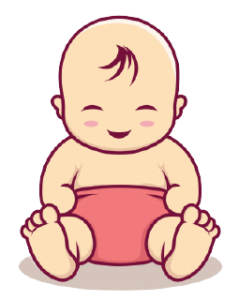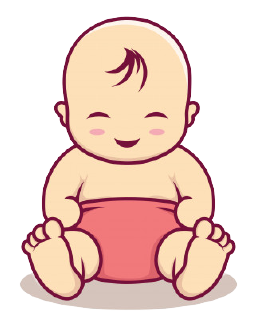Your baby arching their back can be for several reasons such as gas, colic or reflux also for no reason at all.
Parenting is hard and nothing quite prepares you for what you would experience as your baby is handed to you. Although common with babies and toddlers, back arching can be a scary experience. Your little one may throw themselves backwards and arch their back while they are sleeping, feeding, hungry or stretching. This could be an indication of developing their motor skills, trying to communicate their needs or distress. Behavior as such could raise concern whether your baby is in pain or is hurting themselves by arching their back.
It can be hard for babies to communicate their needs the way adults do. But they trust that you will know what to do. However, figuring out what your baby needs can be hard. Hopefully this article will shed some light on why your baby is arching their back and how you can help.
Common Reasons for Baby Back Arching
1. Expressive movement and communications
Babies may arch their backs as a way of expressing their emotions. Babies cannot communicate the way adults do and their only way of communicating their emotions is through movement of their body and sounds. Body movements like arching could be signs of your baby communicating that they are feeling tired and sleepy, hungry, need a change of position or a diaper change.
2. Colic
Colic is a temporary health condition where a healthy baby will cry inconsolably for three hours or more a day for at least three days a week. This can be quite an exhausting and distressing experience for both baby and parents. A colicky baby often shows behavior such as arching their back, clenching their fists, stiffened curled up legs upward, flushed cheeks and crying in a loud high pitched sound, passing gas and a swollen and firm belly. Although the cause for colic is not known, this behavior often lasts for several weeks from around 3-6 months of age. It can be a concern for parents but it does take place for 1 in 5 babies and often naturally wears off with time.
3. Reflux and Gas
Your baby could be arching their back to relieve a gassy belly after breastfeeding as they swallow excess air. It is common for babies to have a reflux. This is clinically known as an Acid Reflux which is a backflow of stomach’s contents where babies may be prone to a Lower Esophageal Sphincter (LES) which is weak or underdeveloped which could result in spitting up and vomiting milk as well as arching their back in release the discomfort.
Persistent reflux could be a sign of gastroesophageal reflux disease (GERD) which would be a digestive condition to take more seriously. GERD could result in your baby vomiting, refusing to eat, difficulties swallowing, losing weight, gagging and choking, heartburn and disturbed sleep.
4. Development of Motor Skills
As your baby grows they start to develop more strength and control as they reach different development milestones. You may notice your baby building strength in their back, neck and upper body and start to slowly lift their head, chest and stay upright on their arms.
5. Temper Tantrums
Babies could throw a tantrum wherever they are feeling frustrated or upset and it could likely be at development milestones such as crawling, rolling over, sitting down, standing. And this frustration could get them to throw their head back and arch their back while having an emotional outburst letting out loud whining and crying as they try to express their needs anmd let out their emotional distress.
Exploring Other Causes of Baby Back Arching
Although a baby arching their back can be a common behavior, there can be less likely but more serious reasons for back arching which should be discussed.
1. Cerebral Palsy
Cerebral Palsy which is a condition due to damage caused in the brain can affect a child physically as well as neurologically. The severity depends on the type of damage to the brain and their symptoms could be signs of restrictions to mobility, motor skills, posture, balance and cognitive development. This could all lead to the delay in development skills.
Regular signs of your baby pushing away and stiffening and arching their back could be notable symptoms and it is best to raise this concern to your pediatrician and seek advice.
Other signs of cerebral palsy may include:
- Abnormal posture
- Crossed of stiffened legs when picked up
- Excessive drooling
- Stiffness of joints and muscles
- Delays in sitting, crawling, rolling or walking
- Unable to pick up objects or put their hands together or bring it to their mouth
2. Seizures
A seizure is uncontrolled movement of arms and legs caused by an excessive electrical activity in the brain which is often a disruption of normal brian activity. In infants it is common to have a focal seizure and epileptic spasm. A baby arching their back could appear to look like seizure like behavior.
Signs of a seizure include:
- Twitching and unusual sensations seen before the seizure takes place
- Not responding, staring and sometimes unconscious
- Uncontrollable muscle spasms
- Uncontrolled bowel movement
3. Sandifer Syndrome
Sandifer Syndrome is a movement disorder where you would notice spasms or unusual movement of the head, neck and back. These temporary muscle spasms could be caused after a baby is fed and contents do not settle well which could cause an acid reflux also called gastroesophageal reflux disease (GERD) or stomach hernia.
Babies often throw their heads back, twist and arch their backs and could happen up to ten times a day for around 1-2 minutes. Treatment for GERD often works to get rid of the Sandifer syndrome symptoms to release stomach acids. It also helps to keep your baby in an upright position after eating or allow tummy time so that gravity keeps the food contents coming up to the esophagus which causes GERD.
Solutions and Treatments for Back Arching

1. Natural Development and Outgrowing Back Arching
Baby arching their back is common and often wears off with time as their muscles develop and they learn to control their body better as they reach the different stages of development.
It is important to understand what your baby is trying to communicate with you and what thier need is. As your baby arch’s their back, try to get the common reasons such as figuring out if your baby is hungry, tired, suffering from acid reflux or some discomfort.
Symptoms such as acid refluxes and GERD will require treatment which will also fix the back arching and also more serious symptoms like Sandifer syndrome.
Other remedies that can help fix the issue of acid reflux include:
- Holding your baby upright after feeling for around 30 minutes reduces the symptoms of acid reflux as gravity keeps the stomach acids down.
- Feed your baby in a semi-upright position to allow it to go down to the stomach that settles in the esophagus.
- Keep track of a food intake- Dairy foods may affect the digestive tract of your baby and it is important to eliminate certain foods that may not work for your baby as tour breastfeed.
- Simple exercises for your baby to reduce and relieve their stomachs from gas and bloating.For instance, bicycle legs, gently running your hands clockwise around their stomach. You could also get the help of a chiropractor or massage therapist who specializes in care for babies.
- Probiotics for children that can help with baby digestions and reduce the symptoms of acid reflux. This can be added to baby’s breastmilk or formula when feeding.
2. Behavioral training for temper tantrums
Temper tantrums are often ways for your little one to communicate a need or their emotional distress. Sometimes all your baby needs is to be cuddled and comforted and have our steady presence and undivided attention. Although it requires a lot of patience and love, soon your baby will calm down and feel relaxed, comfortable and reposition themselves and their emotions. Cuddling helps release a hormone called oxytocin which helps a parent and baby bond better and release the stress and emotional distress, and stabilizes heart rates.
Distraction could help shift your baby’s attention from the problem causing a baby arching their back. This could be done by taking your baby to a different surrounding that is quiet, peaceful to help them settle, humming a song or dimming the lights could also help them relax, and simply speaking or making silly expressions or handing them their favorite toy or blanket.
3. Treating Underlying Health Conditions
Seizures and neurological concerns:
Some more serious symptoms would require medical advice and treatment. Back arching due to seizures or any neurological concern can be alarming for any parent and hard to watch your baby go through it However there is a degree to which this can be dealt with through actions such as:
- Place your baby on the floor gently and remove any objects close to them to keep them from harm and danger
- Lay them on their side to prevent them choking up on saliva
- Loosen or remove clothing to release tightness around the head or neck and help your child breathe better
- Prevent putting anything in your baby’s mouth and blocking the airway including food or water until your baby is fully awake and alert
- Keep track of how long the seizure lasts
- Allow your baby to shake and dont forebly try to stop the seizure. This could make our baby feel uncomfortable.
When to Seek Medical Attention
A baby’s back arching can become serious when associated with other symptoms that become uncontrollable from the way they regularly take place.
- if your baby is suffering from a seizure that lasts for more than 5 minutes and is continuing to be unconscious, having trouble breathing and their face, lips and tongue is turning bluish in color and is having repeated seizures, it is best to get medical care or immediately call 911.
- Your baby could be crying for more that 3 hours and is looking pale with flushed cheeks and is arching their back showing signs of pain and discomfort.
- Feeling irritable when feeding, refusing to feed and is losing weight and now wetting their diaper or throwing up every time you feed. This could be cause of concern
Symptoms related to neurological concerns causing back arching such as the following would require urgent medical and emergency cared:
- Constant seizures
- Stiffness in muscles
- Difficulty in latching, feeding and swallowing
- High pitched crying for hours
- Swollen spots on your babies head or bulging areas
Conclusion
Your baby arching their back as you lift them up, as they sleep or feed can be a scary experience as you worry if their behavior of throwing their head back and twisting their delicate body hurts them or causes pain. But this is common among babies and this behavior can be for no specific reason. However this could also be for different reasons such as trying to communicate their needs, development of motor skills, colic and temper tantrums. Persistent movement could raise concern and be of particular health concern along with other symptoms such as stiffening of muscles, unusual twitching, crying for hours could be for reasons such as cerebral palsy or seizures. As a parent it is important that you are attentive to different behaviors and the occurrence of your baby arching their back. If your baby’s movement seems unusual and does worry you, it is always best to contact your pediatrician and explain your concern and seek guidance on how you can help your baby as well screen them for more serious symptoms as your doctor recommends.


